When David Scott suddenly had slurred speech that left a friend thinking he was having a stroke, he contacted his GP for help—only to be asked by a receptionist if he had been ‘drinking’.
But just seven months later, he was told the actual cause was an incurable, life-wrecking—and ultimately deadly—condition.
The father-of-two, 60, from Leicestershire, known as ‘Davy’ to friends and family was eventually diagnosed with motor neurone disease (MND) in February 2024.
The illness, which took the life of renowned physicist Stephen Hawking, robs sufferers of their ability to move, talk and eat.
To raise awareness of the incurable condition, Mr Scott has shared photos that show the cruel reality of ‘this horrific disease’ that is causing his body to die ‘day by day’.
They include images of him being fed liquid food through a special tube and using equipment to help him breathe.
On the pictures, taken by a professional photographer, Mr Scott said: ‘They say a photo can say a thousand words. The pain and suffering come through the photos.
‘MND has been devastating for me and my family, it has been aggressive, and the only way to show the impact it has had on me is through these pictures.’
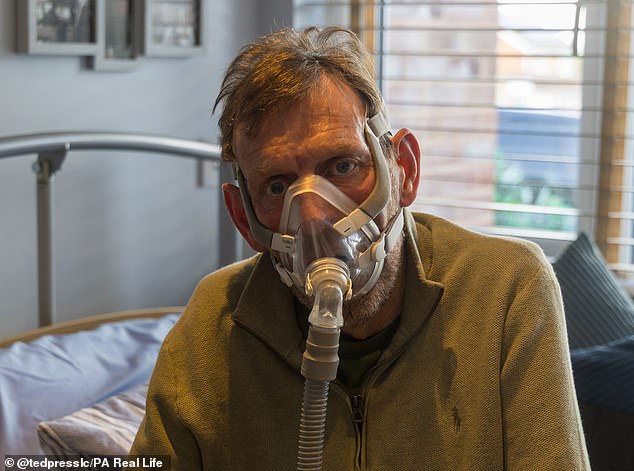
The pictures show Mr Scott diagnosed with motor neurone disease using equipment to breath
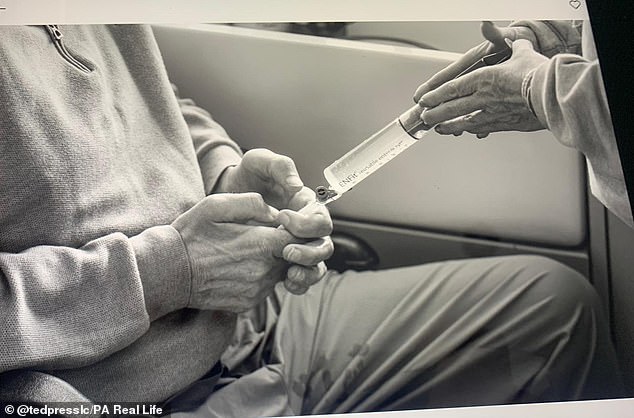
One of the professional photos show Mr Scott now being fed a liquid diet through a special tube
Previously 15 stone, Mr Scott now weighs around 10 stone, and as he can no longer talk, eat or drink by mouth, he is fed with a tube connected directly to his stomach.
He stopped working in October 2024 as he was finding it hard to speak, and now relies heavily on his wife Claire and his carers, claiming he is now ’80 per cent dependent’ on them.
He is no longer able to have a conversation, so relies on an iPad as a communication aid, and estimates that within the next few months he will no longer be able to walk.
Mr Scott said: ‘It’s an emotional rollercoaster as you have good days and bad days. However, the hardest thing to deal with is the frustration.
‘You know what you want to do, you know what you want to say, but you can’t. Your body is dying day by day, bit by bit, and you have no control over what direction it takes.
‘There are days and nights where I cry and ask, “Why me, but why not me?”, but there are no answers.
‘There are times when you wish you were not here and not causing the pain and suffering that your family and friends are going through because of my illness.’
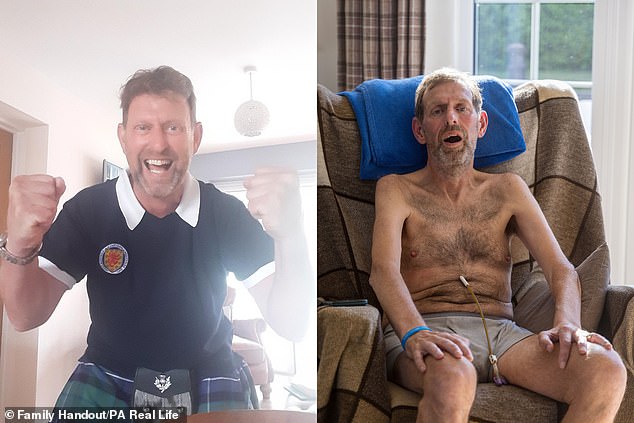
These images from before and after being diagnosed show the harrowing toll on his body
Before his diagnosis he said he experienced ‘no health problems and was relatively fit’, until he started having chest pains in 2021.
Although he was ‘given the all-clear’ at hospital at the time, he said follow-up appointments led doctors to believe he had a ‘slight narrowing’ of one of his main valves in his heart.
In June 2023, however, a friend thought Mr Scott had experienced a minor stroke as his speech was slightly slurred. This was when he called for medical advice, and he claims a receptionist accused him of ‘drinking’.
‘I ended up going private, but I did have my appointment with my heart consultant in November 2024,’ he explained.
‘After some tests she did with me at the time of my appointment, she confirmed that there was something wrong and that I needed to see a neurologist ASAP.
‘I said that I had tried to explain tried to explain this without success and was accused of drinking.’
Then after being referred to see a specialist by his GP, Mr Scott underwent further tests and scans and was told on February 20, 2024, that he had MND.
Apart from seeing the occasional clip on TV about former rugby league player Rob Burrow, who died of MND in June 2024, Mr Scott said he knew ‘nothing’ about the condition.
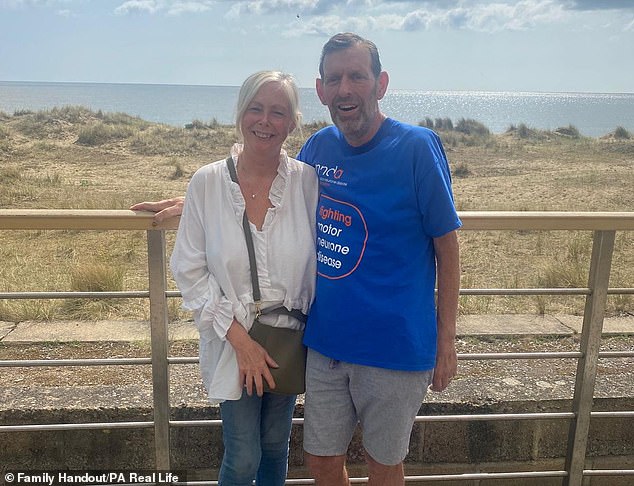
Mr Scott with his wife Claire who was next to him when he was given his devastating diagnosis

Mr Scott completed the Yorkshire Three Peaks Challenge as part of his many fundraising events
‘I had undergone a couple of tests, and I just knew that it wasn’t going to be good news,’ Mr Scott explained.
‘Luckily, my wife Claire was with me at the time when I was told. You could have blown me down with a feather.
‘I knew it was a terminal illness and there was no cure or treatment, so I asked the question, ‘How long do I have to live?’, and I was told between two to four years.
‘I called family and broke the news, and Claire and I met my mate Justin and his wife Karen in the pub and discussed my future.’
He described the toll of his diagnosis as a ‘living nightmare’. The greatest challenges, he said are ‘the mental and emotional battles’ he has ‘on a daily basis’.
‘You keep things to yourself as you don’t want to worry others, and with my disability and mobility, you know it’s only going to become worse,’ Mr Scott explained.
Now he is taking the standard medication, receives support from Loros Hospice and The Matt Hampson Foundation, and sometimes sees a dietitian and speech therapist.
But he feels there needs to be more ‘specialist support’ for MND patients. So, he is calling on the Government for greater support, funding and research into the illness.
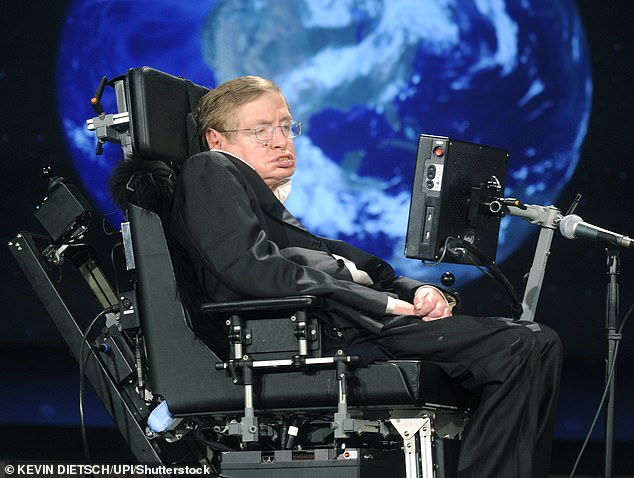
ALS can lead to paralysis and eventually death. The acclaimed scientist Stephen Hawking famously suffered from it
Your browser does not support iframes.
‘I may not have long left to live, but I’m not just going to sit and wait. The Government needs to contribute more into helping find a cure for this horrific disease,’ he said.
‘It’s not down to one person. It’s down to all of us working together as a team. Together we can and we will make a difference.’
A government spokesperson said: ‘David’s sad experience, as his condition has progressive worsened, shows how cruel motor neuron disease can be.
‘It has a devastating impact on people’s lives, and we are determined to find a cure.
‘This Government will continue to fund high-quality research into motor neuron disease through the National Institute for Health and Care Research.’
In the meantime, Mr Scott and others have raised around £60,000 to help support MND research and the MND Association through charity events.
Early symptoms of MND can include stiff or weak hands, weak legs and feet, twitches, spasms or muscle cramps, according to the NHS.
But others include pins and needles, fatigue, extreme tiredness, tripping and one or both legs getting thinner, say the MND Association.
Around 5,000 adults in the UK have ALS and there is a one in 300 risk of developing the condition over the course of a person’s life.
Life expectancy for about half of those with the condition is between just two and five years from the onset of symptoms. But these can worsen rapidly.
Some people may live for up to 10 years, and, in rarer circumstances, even longer.
Along with twitches, cramps and muscle weakness are among the early signs of the condition, along with slurred speech and weight loss.
There is no cure but doctors can provide treatments to help reduce the impact it has on a person’s life.
The exact cause is largely unknown, but current research points towards a complex interplay of genetic, environmental, and possibly lifestyle factors—and it often hits seemingly fit and healthy people.
